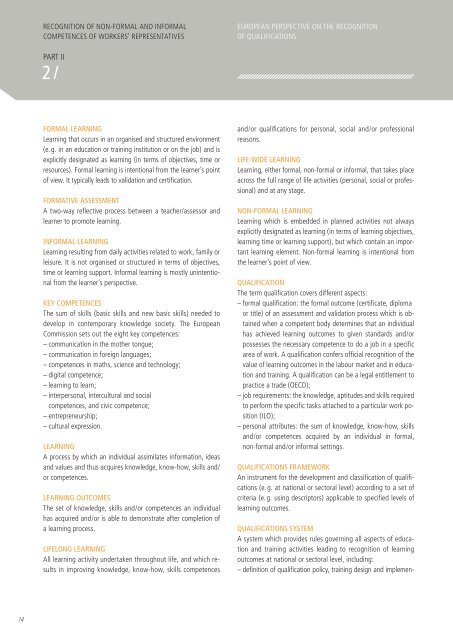RECOGNITION OF NON-FORMAL AND INFORMAL ... - Solidar
RECOGNITION OF NON-FORMAL AND INFORMAL ... - Solidar
RECOGNITION OF NON-FORMAL AND INFORMAL ... - Solidar
Create successful ePaper yourself
Turn your PDF publications into a flip-book with our unique Google optimized e-Paper software.
<strong>RECOGNITION</strong> <strong>OF</strong> <strong>NON</strong>-<strong>FORMAL</strong> <strong>AND</strong> IN<strong>FORMAL</strong><br />
COMPETENCES <strong>OF</strong> WORKERS’ REPRESENTATIVES<br />
EUROPEAN PERSPECTIVE ON THE <strong>RECOGNITION</strong><br />
<strong>OF</strong> QUALIFICATIONS<br />
PART II<br />
2 /<br />
<strong>FORMAL</strong> LEARNING<br />
Learning that occurs in an organised and structured environment<br />
(e. g. in an education or training institution or on the job) and is<br />
explicitly designated as learning (in terms of objectives, time or<br />
resources). Formal learning is intentional from the learner’s point<br />
of view. It typically leads to validation and certifi cation.<br />
FORMATIVE ASSESSMENT<br />
A two-way refl ective process between a teacher/assessor and<br />
learner to promote learning.<br />
IN<strong>FORMAL</strong> LEARNING<br />
Learning resulting from daily activities related to work, family or<br />
leisure. It is not organised or structured in terms of objectives,<br />
time or learning support. Informal learning is mostly unintentional<br />
from the learner’s perspective.<br />
KEY COMPETENCES<br />
The sum of skills (basic skills and new basic skills) needed to<br />
develop in contemporary knowledge society. The European<br />
Commission sets out the eight key competences:<br />
– communication in the mother tongue;<br />
– communication in foreign languages;<br />
– competences in maths, science and technology;<br />
– digital competence;<br />
– learning to learn;<br />
– interpersonal, intercultural and social<br />
competences, and civic competence;<br />
– entrepreneurship;<br />
– cultural expression.<br />
LEARNING<br />
A process by which an individual assimilates information, ideas<br />
and values and thus acquires knowledge, know-how, skills and/<br />
or competences.<br />
LEARNING OUTCOMES<br />
The set of knowledge, skills and/or competences an individual<br />
has acquired and/or is able to demonstrate after completion of<br />
a learning process.<br />
LIFELONG LEARNING<br />
All learning activity undertaken throughout life, and which results<br />
in improving knowledge, know-how, skills competences<br />
and/or qualifi cations for personal, social and/or professional<br />
reasons.<br />
LIFE-WIDE LEARNING<br />
Learning, either formal, non-formal or informal, that takes place<br />
across the full range of life activities (personal, social or professional)<br />
and at any stage.<br />
<strong>NON</strong>-<strong>FORMAL</strong> LEARNING<br />
Learning which is embedded in planned activities not always<br />
explicitly designated as learning (in terms of learning objectives,<br />
learning time or learning support), but which contain an important<br />
learning element. Non-formal learning is intentional from<br />
the learner’s point of view.<br />
QUALIFICATION<br />
The term qualifi cation covers different aspects:<br />
– formal qualifi cation: the formal outcome (certifi cate, diploma<br />
or title) of an assessment and validation process which is obtained<br />
when a competent body determines that an individual<br />
has achieved learning outcomes to given standards and/or<br />
possesses the necessary competence to do a job in a specifi c<br />
area of work. A qualifi cation confers offi cial recognition of the<br />
value of learning outcomes in the labour market and in education<br />
and training. A qualifi cation can be a legal entitlement to<br />
practice a trade (OECD);<br />
– job requirements: the knowledge, aptitudes and skills required<br />
to perform the specifi c tasks attached to a particular work position<br />
(ILO);<br />
– personal attributes: the sum of knowledge, know-how, skills<br />
and/or competences acquired by an individual in formal,<br />
non-formal and/or informal settings.<br />
QUALIFICATIONS FRAMEWORK<br />
An instrument for the development and classifi cation of qualifi -<br />
cations (e. g. at national or sectoral level) according to a set of<br />
criteria (e. g. using descriptors) applicable to specifi ed levels of<br />
learning outcomes.<br />
QUALIFICATIONS SYSTEM<br />
A system which provides rules governing all aspects of education<br />
and training activities leading to recognition of learning<br />
outcomes at national or sectoral level, including:<br />
– defi nition of qualifi cation policy, training design and implemen-<br />
14
















